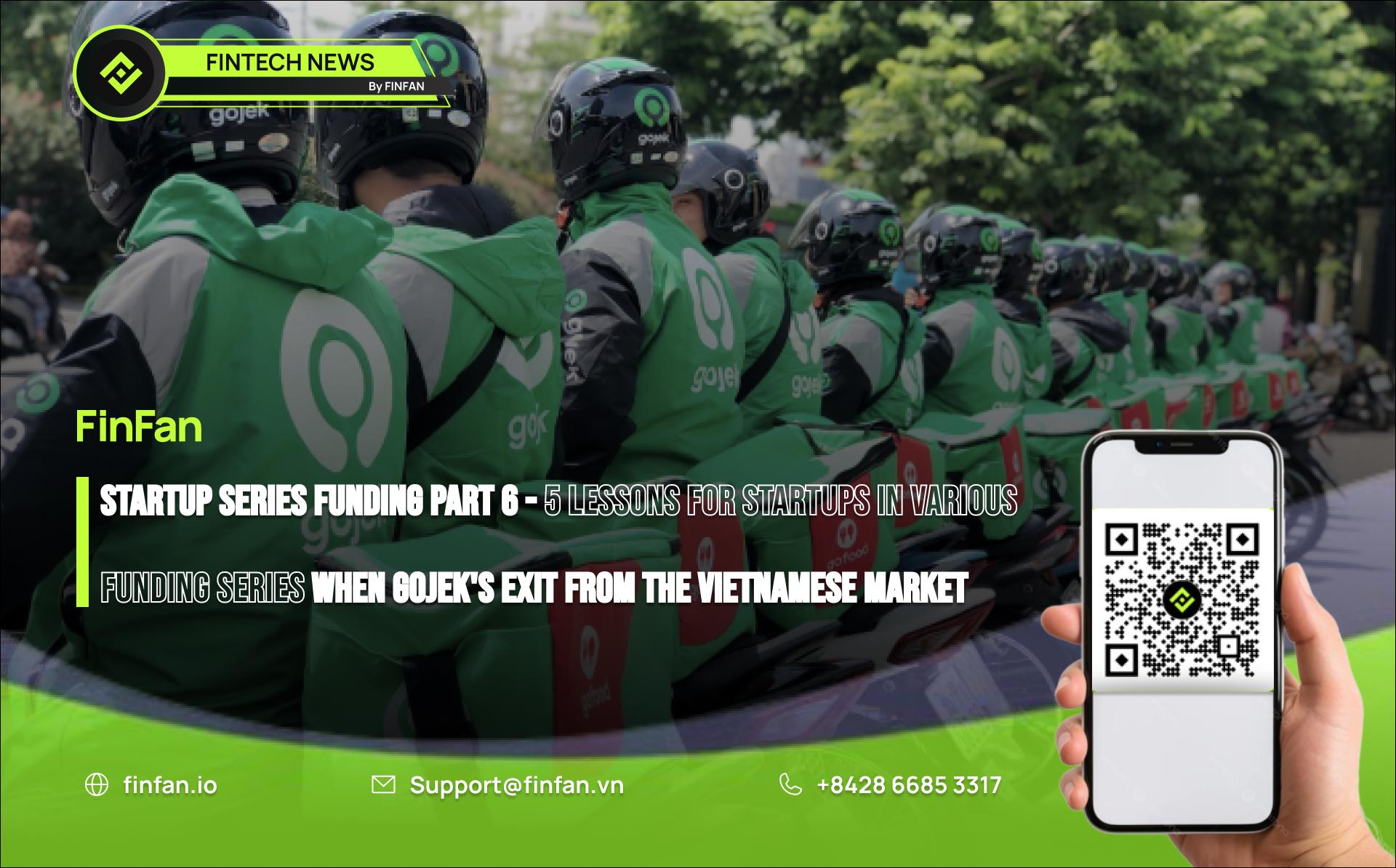Startup Series Funding Part 6 - 5 Lessons for Startups in Various Funding Series as Gojek exits from the Vietnamese Market

Recently, a renowned unicorn startup from Indonesia, valued at nearly 40 billion USD in the ride-hailing sector, Gojek, officially announced that they will be withdrawing from the Vietnamese market on September 16.
The recent withdrawal of Gojek from the Vietnamese market is a significant event that carries important lessons for startups, especially those in various stages of series funding.
As one of the largest players in Southeast Asia's ride-hailing and logistics sector, Gojek's exit serves as a cautionary tale for companies seeking to expand into new markets.
Below, we explore 5 key takeaways from Gojek’s experience and how they apply to startups aiming for long-term success.
Adapting to Local Markets is Crucial
Gojek’s success in Indonesia did not automatically translate into success in Vietnam. While Gojek was able to build a dominant presence in its home market, the company struggled to fully adapt its services to meet the specific needs and preferences of Vietnamese consumers.
For example, in Vietnam, Grab had already established a solid foothold, and Gojek’s strategy did not offer significant differentiation to sway the local customer base.
Lesson for startups:
Whether a startup is expanding regionally or internationally, in-depth research and adaptation are crucial.
This involves understanding the local market dynamics, customer behavior, and regulatory environment.
Startups need to tailor their services and marketing strategies to resonate with local cultures rather than relying on a one-size-fits-all approach.
Sustainable Growth Over Market Share Blitz
A common strategy among fast-growing startups is to engage in heavy spending to capture market share quickly.
Gojek followed this model by investing heavily in promotions, discounts, and aggressive marketing campaigns.
However, this “blitzscaling” approach can lead to long-term financial strain if not managed carefully.
Without achieving sufficient operational efficiency or customer loyalty, high spending can deplete resources before the business becomes self-sustaining.
Lesson for startups:
Instead of focusing solely on burning through capital to acquire users, startups should develop a balanced strategy that prioritizes sustainable growth.
This includes building long-term customer relationships, improving operational efficiency, and ensuring the company can maintain profitability once initial funding runs out.
A prime example is the ride-hailing app Xanh SM, a Vietnamese startup backed by Vin Group, which emerged after Gojek.
Xanh SM learned from Gojek's critical mistakes and created unique membership packages for customers, addressing loyalty while also personalizing the customer experience with offers closely aligned to their ride-hailing behavior.
A second advantage of implementing programs like Xanh SM is that startups can gain deeper insights into user behavior, enabling them to offer additional services.
For example, Xanh SM is preparing to launch a personalized car rental service tailored to individual customers.
Strategic Partnerships Matter
Gojek could have benefited from stronger local partnerships to enhance its market presence.
Partnering with key players in the local ecosystem—such as payment providers, delivery networks, or local tech firms—could have helped Gojek tap into the existing infrastructure and gain market traction more effectively.
Lesson for startups:
In foreign markets, partnerships with local companies are vital. Strategic collaborations can provide access to essential resources, networks, and insights, helping startups to scale more quickly and navigate the local market more efficiently.
Returning to the story of Xanh SM, partnering with a local giant like VinFast was immensely beneficial in the early stages when the tech company was still relatively unknown and struggled to expand its driver network.
For VinFast, Xanh SM's growth also created a significant demand for electric vehicles in the domestic market.
This collaboration aligns with the current trend among Vietnamese youth toward eco-friendly living and environmental protection.
Operational Efficiency is Key
In highly competitive markets like Vietnam, where rival companies like Grab dominate, operational efficiency becomes a critical factor for success. Gojek struggled to optimize costs while maintaining a competitive service level. Inefficient operations can erode margins, making it difficult to sustain the business even with substantial capital.
Lesson for startups:
Startups must continuously work to streamline their operations, particularly in competitive markets.
This includes optimizing supply chains, reducing operational costs, and investing in technology that enhances efficiency.
In the long run, only companies that can balance growth with efficiency will thrive.
Agility in Market Response
The market in Vietnam, like many others, is subject to rapid changes due to economic, regulatory, and competitive shifts. Gojek’s inability to react swiftly to these changes limited its ability to compete. Startups, especially those in series funding rounds, must have the ability to pivot when necessary—whether due to new competitors, changing customer preferences, or regulatory challenges.
Lesson for startups:
Flexibility and quick decision-making are essential in any market. Startups should regularly assess market conditions and be ready to adapt their strategies when faced with new challenges or opportunities.
A well-prepared company can respond quickly, turning potential threats into advantages.
Final Thoughts: Funding Alone Isn’t Enough
While Gojek had significant financial backing, its exit from Vietnam illustrates that funding alone is not a guarantee of success.
Startups need to combine financial resources with local market expertise, strategic partnerships, operational excellence, and a flexible approach to market dynamics.
The lessons from Gojek’s experience in Vietnam serve as a reminder that startups in series funding rounds should focus not just on raising capital but on building a sustainable, adaptable, and market-specific growth strategy.
By applying these lessons, startups can better position themselves to thrive in competitive markets and avoid the pitfalls that can lead to a premature exit.
This article was curated and authored by FinFan's market research and development team, alongside our marketing department.
About FinFan
FinFan is a cross-border embedded financial services company that focuses on mass disbursement, fund collection, card processing, IBAN, and digital APMs solutions, which can provide valuable input and integration on and for the same.
FinFan is already integrated with almost the world's well-known MTOs, PSPs, switch, and core fintech platforms such as Money Gram, Thunes, Qiwi, Remitly, World Remit, Bancore, PaySend, Terrapay, Ria Money Transfer (Euronet), Dlocal, Ripple, TripleA, FoMo Pay, Wings, etc.
For more information, please get in touch with us through:
🌐https://finfan.io
📞(+84) 2866 85 3317
✉ support@finfan.vn
LinkedIn: FinFan





